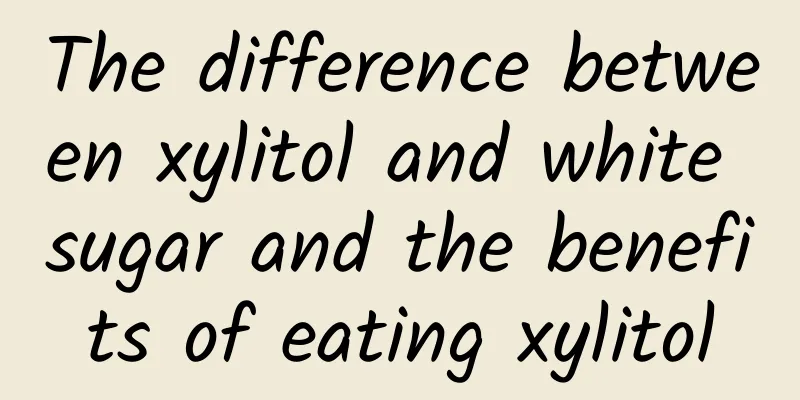The difference between xylitol and white sugar and the benefits of eating xylitol

|
Both xylitol and white sugar are sweet, and both are white crystals that are very similar, but they are two completely different foods, and their effects on the human body are also different. There are obvious differences between xylitol and white sugar. If you want to learn more about this, you can read the detailed introduction of xylitol and white sugar below. It will also let everyone know the benefits of eating xylitol. The difference between xylitol and white sugar1. Xylitol and white sugar have different sources. White sugar is natural sucrose extracted from sugarcane and has a particularly high sugar content, while xylitol is an intermediate product of xylose metabolism. It is a plant essence extracted from birch trees, corn cobs, vegetables and grains in nature. Although it has a sweet taste, its sugar content is particularly low. 2. The effects of xylitol and white sugar on the human body are also very different. White sugar is a food with a particularly high sugar content. After people eat white sugar, their blood sugar will rise and it will aggravate the condition of human diabetes. Therefore, in daily life, people with high blood sugar and diabetes cannot eat white sugar. However, xylitol is different. Xylitol has no adverse effects on the human glycemic index and can keep human blood sugar in a normal state. People who already have diabetes can still eat xylitol. 3. Xylitol is not harmful to human teeth. It will not corrode or cause tooth decay. White sugar is different because it is very sweet and has a high sugar content. It has a significant corrosive effect on human teeth. Frequent consumption can easily cause vegetative teeth and toothache. There is also a significant difference in the price of xylitol and white sugar. Xylitol is a relatively expensive sweetener, while white sugar is relatively cheap. The benefits of eating xylitolXylitol is a plant essence extracted from many plants by humans. It is a plant sweetener. It will not affect human blood sugar, nor will it convert sugars in the body into fat and accumulate in the body. Therefore, eating xylitol will have certain benefits to the body. It can promote digestion, speed up body metabolism, and keep people slim. It will also reduce the incidence of hyperglycemia and diabetes. |
<<: The harm and benefits of MSG
>>: The efficacy and effects of xylitol Side effects of xylitol
Recommend
How to pickle green peppers How to pickle green peppers
Chili peppers can bring a hot and spicy taste, wh...
What to do if pregnant women are calcium deficient? Common calcium supplement recipes for pregnant women
Many women will experience adverse symptoms such ...
Will eating zongzi make you fat? How to eat zongzi without getting fat?
Zongzi is a traditional food in my country. Many ...
Nutritional value of Phoenix Mushroom and how to cook Phoenix Mushroom at home
Phoenix tail mushroom is not only delicious but a...
How is the Moscow Locomotive? Moscow Locomotive Reviews and Website Information
What is the website of Lokomotiv Moscow? FC Lokomo...
Millet, Red Dates, Pumpkin Porridge
I wonder how much you know about millet, red date...
Effects and nutritional value of hazelnut oil
Hazelnut oil is a high-grade edible oil, which is...
Nutritional value and edible effects of pine nuts
The nutritional value of pine nuts is very high. ...
What are the benefits of pear skin and pear flesh
It is a delicious fruit that people often eat. It...
Egg steamed meatballs method steps
Steamed meatballs with eggs is a dish that many c...
The difference between Taiwanese milk tea and Hong Kong-style milk tea
Many people like to drink milk tea in life, but w...
How is Malmö University? Malmö University reviews and website information
What is the website of Malmö University? Malmö Uni...
How to make delicious cashews
Cashews are a kind of nut that many people know. ...
Medicinal value of tomatoes
Tomatoes are not only delicious fruits and vegeta...
How to cook dried cowpea with meat
Dried cowpea and meat is my favorite dish. My mot...









